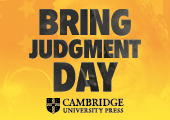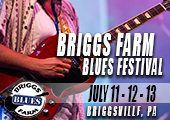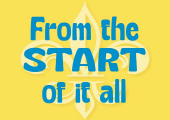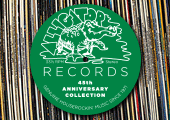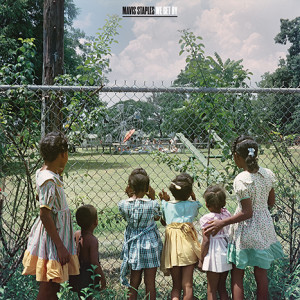 MAVIS STAPLES
MAVIS STAPLES
We Get By
ANTI- – 87670-2
When it comes to African American roots music—for that matter, any American roots music at all—the Staples name is royalty. Led by Roebuck “Pops” Staples, the Staple Singers made music that did more than just transcend genres; it erased the divisions between them. The group’s anthemic, soul-stirring songs had the same effect upon listeners, using music as a way to bring people together.
After the family band ceased operations, daughter and vocalist Mavis Staples continued as a solo artist. Carrying on her family’s tradition of crossover appeal, she appeared at nominally rock-focused festivals like Bonnaroo and Glastonbury (multiple times at each, in fact), often collaborating with other artists.
As she reaches her 80th year (of which all but the first ten found her performing), Staples is releasing We Get By, her 12th studio album. The new record continues Staples’ proven successful method of working with perhaps unexpected producers. Monsters of Folk guitarist M. Ward produced 2016’s Livin’ on a High Note, and 2017’s If All I Was Was Black was the third time Staples worked in the studio with Wilco’s Jeff Tweedy producing.
For We Get By, Staples chose as her producer fellow Grammy Award–winner Ben Harper. Harper’s own musical eclecticism is perhaps more in line with the Staples family tradition than any previous studio collaborator; the result is an album that’s breathtaking in its musical scope. The heavy distortion of Change, for example, combines dirty blues and moving gospel. There’s a level of authenticity that bridges the gap between rock concert and Sunday morning revival. And the sinewy, irresistible groove of classic-era Staple Singers is brought to life on Anytime.
Harper—who, like Tweedy before him, wrote all of the songs for Mavis’ album—has a keen understanding of what makes the singer special. And he’s helped mightily in his efforts by Mavis herself, who’s in as fine a voice as ever. Because there’s so much emotional content inherent in her delivery, the vocalist can hold back and still deliver. Still, now and then she lets loose at just the right time, proving that she can still hit those high notes (and deep notes) when she cares to.
We Get By isn’t all up-tempo stuff; the aptly named Heavy on My Mind is as moody as it is minimalist. But cuts like Sometime are more representative of the album’s overall character; the song all but compels the listener to clap along, even if said listener isn’t the praying kind.
The choice of using the same set of musicians—a band, one might even say—for the whole album adds to its cohesive character. Few artists are still working 70 years into their career; fewer still are bringing forth the kind of quality found on We Get By. Long live Mavis Staples.
—Bill Kopp
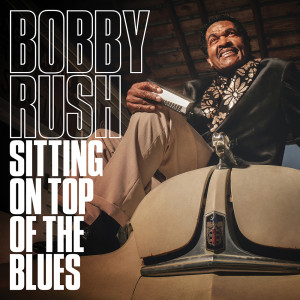
BOBBY RUSH
Sitting on Top of the Blues
Deep Rush Records / Thirty Tigers – 10215CD
Bobby Rush is the perfect candidate for an Energizer endorsement deal—he just keeps going and going. With a career reaching back to the late 1940s and more than 20 albums under his belt, including the Grammy Award–winning Porcupine Meat (2016), the 85-year old singer and harmonica man has assumed the position of a reigning elder statesman who is truly Sitting on Top of the Blues.
The 11 selections on this set were composed by Rush and represent a mastery of a wide range of approaches to the blues genre. Rush’s lieutenant in bringing his musical vision to fruition is the multi-instrumentalist Vasti Jackson, who assembled a strong supporting cast, including New Orleans drummers Terrence Higgins and Raymond Weber, bassist Tony Hall, and keyboardist Keiko Komaki. The tracks co-produced by Jackson and Rush highlight the versatility and adaptability of the leader’s approach to vocals and harmonica. Good Stuff rides Jackson’s stripped-down, pulsing Hill Country groove (he plays multitracked bass, drums, and guitar) punctuated by Rush’s wailing harmonica. Weber, Hall, and Komaki, with Jackson on guitar, lock into a percolating Allen Toussaint–inspired R&B groove under Rush’s wry vocal and buoyant harmonica work on Sweet Lizzy. With Recipe for Love, Rush and Jackson go back to the roots and team up for an acoustic guitar/harmonica and vocal country blues duet. It’s a far cry from Rush’s live show booty-shakin’, funk extravaganza and highlights the essence of the man’s blues-drenched soul. Of course, those funky grooves are well represented with numbers like the bouncy Pooky Poo, the sexy jam Slow Motion that brings to mind Isaac Hayes or Barry White, and Shake Til’ You Get Enough, a harmonica-punctuated, sure-to-inspire a line dance soundtrack.
Patrick “Guitar Boy” Hayes is added to the production team for three soul blues outings: Hey Hey Bobby Rush, Get Out of Here (Dog Named Bo), and Bowlegged Woman, which will easily slot into Rush’s live repertoire. Scott Billington, who served as producer last time around, returns for two tracks, You Got the Goods on You, a bouncy R&B outing, and Bobby Rush Shuffle, a rocking, instrumental, James Cotton–style harmonica showcase. Recorded in Southwest Louisiana at Dockside Studio, these songs feature the cream of the local blues and zydeco musicians, including the late Lil’ Buck Sinegal and Roddie Romero (along with Jackson) on guitars, Lee Allen Zeno on bass, and Doug Belote on drums. Bobby Rush may be Sitting on Top of the Blues, but one thing’s for sure—he’s going to keep on going and going.
—Robert H. Cataliotti
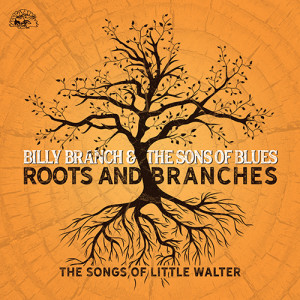 BILLY BRANCH & THE SONS OF BLUES
BILLY BRANCH & THE SONS OF BLUES
Roots and Branches—The Songs of Little Walter
Alligator Records – ALCD 4992
Roots and Branches—The Songs of Little Walter cements Billy Branch’s place among the kings as he and his Sons of Blues dedicate this disc to the best who ever did it. Billy leads the way on harmonica and vocals, with a backing band of longtime Chi-town veteran Sumito “Ariyo” Ariyoshi on piano, Giles Corey on guitar, Marvin Little on bass, and Andrew “Blaze” Thomas on drums. They deliver 14 tracks of the most popular selections from Walter’s repertoire, but the band cooked up their own batch of blues, soul, R&B, funk, and gospel grooves to infuse some freshness into the fabric of these classics—plus a bonus track of Walter’s daughter Marion Diaz talking about memories of her dad.
On Mellow Down Easy, Branch shows his mastery of range, while the band gets a funk-gospel groove going. Roller Coaster reminds us how well Walter could build a seemingly endless solo over a one-chord vamp. Blue and Lonesome typifies the West Side style, with great blues guitar work à la Otis Rush / Magic Sam from Corey, and some of Branch’s best minor blues harp licks playing G diatonic on a C chromatic harp. It’s also one of his best vocal performances on the entire album.
Hate to See You Go is a one-chord, Lightnin’ Hopkins–esque boogie which shows the ingenuity of Branch’s chugging, incessant groove and growl. My Babe gets a wonderful New Orleans–flavored tinge that would make Professor Longhair smile. After the first two verses, it suddenly shifts back home to the hard Chicago shuffle, even as the chord progression blends in a few jazz changes for good measure (Giles Corey squeezes off a tasty pair of guitar solo choruses). A few tracks later in the album, we find that It’s Too Late Brother actually has the original My Babe groove on it.
Juke is not the jump blues instrumental we expected—its greasier and funkier, with a slightly different set of chords, even as Branch liberally snatches verbatim quotes from the well-known solo. Equally surprising is the rendition of Last Night, arranged more on the sassy end of the spectrum. It’s a bold move that really works for Branch and Sons, especially with the plentiful piano rolls that Ariyo employs underneath the vocals.
Just Your Fool / Key to the Highway is a funk fest that Billy’s vocals are custom-tailored for. They modulate out of Just Your Fool and seamlessly segue into a new key with chord changes of Key to the Highway.
Boom Boom Out Go the Lights is played pretty close to the original version—just a good, hard-driving shuffle that swings like mad, with a howlin’ harp attack that really burns. On the other end of the spectrum, One More Chance With You has a smooth-walking bass line and cascading jazzy piano riffs from Ariyo, with guest artist with Shoji Naito sitting in on guitar.
The last two tunes find the band playing it straight—You’re So Fine has the brisk, patented double shuffle, while Blues With a Feeling is as good an example of the classic Chicago sound as any on the album—with beautiful Otis Spann–flavored piano solo, Jimmy Rogers–style rhythm guitar, and the Walter harp squall from Branch. It’s as strong an ending as anyone could have asked for.
Billy and his band are tighter than a snare drum head. Harp blowers everywhere will rejoice.
—Wayne Goins
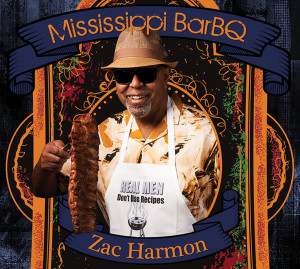 ZAC HARMON
ZAC HARMON
Mississippi BarBQ
Catfood Records – CFR-028
His label may be based in El Paso, but Zac Harmon puts his Mississippi roots front and center. This disc’s inside sleeve even includes a recipe for Mississippi barbequed ribs (which, of course, would be pork ribs, not the beef usually preferred in Texas).
That said, though, the music spans an agreeably broad stylistic/regional spectrum. The title song, instead of what might be the expected juke-joint raver, is a breezy, urbane, pop-soul celebration of family, community, and heritage, along with the savory soul food that exemplifies it, that recalls R. Kelly’s 2015 hit Backyard Party. Elsewhere, Harmon digs in to more aggressive sounds, such as the spikey, blues-funk, hard-times anthem Make a Dollar Out of Fifteen Cents (on which his voice, unfortunately, can’t match the rough-hewn grit of the sound and storyline). He sounds vocally more at ease with Lord Save Me From L.A., the lament of a formerly idealistic migrant who finds himself ground down by that city’s relentless soul-crushing, high-tech/high-speed Silicon Valley culture. Harmon’s guitar work ranges from in-the-pocket blues sparseness to power-pop grandiosity, but it’s always tasteful and musically on point—no self-indulgent noodlings or pryotechnics.
Harmon and his band don’t wear their influences on their sleeves, but they’re subtly evident throughout. The undulating bassline, piano/harmonica interplay (along with Bob Corritore’s Cotton-esque harp solo), and lurching cadence of Honey Pleeze recall Muddy Waters’ 1981 version of King Bee; Dan Ferguson’s burbling keyboard line in Smoke and Mirrors sounds based on Stevie Wonder’s Superstition; Sunday Morning After Saturday Night swings with an unforced hipness that invokes Latimore’s classic 1973 take on Stormy Monday (which itself arose in the wake of Lou Rawls and Les McCann’s early ’60s version).
As noted, Zac Harmon isn’t the world’s most expressive vocalist, and when the occasion calls for grit, anguish, or erotic intensity, he can sometimes sound strained or out of his element. Nonetheless, on a purely musical basis, he and his studio crew here deliver a tasteful, soulful, and winningly diverse set of contemporary blues and blues-based offerings.
—David Whiteis
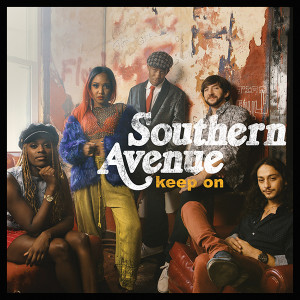 SOUTHERN AVENUE
SOUTHERN AVENUE
Keep On
Concord Records – CRE00951
Southern Avenue caught ears critically and commercially with the successful release of their debut in 2017, and the Memphis retro-soul outfit continues to gain momentum at home and abroad. Their stunning sophomore set should certainly help in that regard. Crafted with care and full of killer singing, playing, and songwriting, Keep On builds on the strengths of their first album and surpasses it.
Produced by Johnny Black and recorded at Memphis’ Sam Phillips Recording, the band—lead vocalist Tierinii Jackson, guitarist Ori Naftaly, drummer and vocalist Tikyra Jackson, and keyboardist Jeremy Powell—has given their potent R&B, rock, blues, and soul sound a fuller, richer bloom. Her voice equal parts power, clarity, and beauty, Tierinii’s lush vocal blend with sister Tikyra stands out on the love songs Savior and Lucky and the hopeful anthem We’re Gonna Make It; Tikyra matches Tierinii’s vocal force with her drums on the frenetic Jive. Whiskey Love gets a shot of funk from Naftaly, Powell, and bassist Gage Markey’s swirling licks, while their breezy playing on Too Good for You injects a bit of country into their soul.
William Bell makes a guest appearance on We’ve Got the Music, on which he also shares a co-writing credit. Tierinii’s and Bell’s harmonies, together with Tikyra’s steady drumming and Art Edmaiston and Marc Franklin’s smooth horns, infuse the all-too-brief gospel rocker with the uplifting spirit of the Stax-era Staple Singers. She Gets Me High is a stomping scorcher of a ballad, with Tierinii’s passionately soaring vocals echoed by Naftaly’s torrential fretwork.
“You get what you put out,” Tierinii sings on the surging title track, and Southern Avenue is certainly doing that. If Keep On is any indication, they will only rise higher from here.
—Melanie Young
 VIVIAN VANCE KELLY
VIVIAN VANCE KELLY
Chicago Here I Come
Wolf Records – 120.840
Vivian Vance Kelly is the daughter of esteemed Chicago fretman Vance Kelly; he and members of his Backstreet Band, one of Chicago’s tightest and most versatile aggregations, accompany her here. Her voice is powerful and expressive, nuanced when the occasion demands it, straight-out stentorian when it’s time to bare her soul, with an undercurrent of witty irony.
Kelly’s gender-switched version of Z.Z. Hill’s Blues Man, though, might not have been the wisest choice for an opener; she seems to be working a little too hard to fill Hill’s shoes. Better to showcase her gifts as a songwriter, whether she’s purveying a funky, New Orleans–tinged workout (Is It Love?) or a breezy pop-soul ballad (As Simple as This). The influence of Betty Wright makes itself clear in her phrasing and vocal timbre on As Simple as This; as if to remove all doubt, she also turns in a feisty cover of Wright’s Clean Up Woman (although once again it sounds as if she’s working a bit too hard to do justice to material already associated with a well-known vocalist. Similarly, she also takes on Ben E. King’s Stand By Me and Denise LaSalle’s Your Husband Is Cheating on Us.) The title tune, propelled by Stan Nixon’s funk-blues bass, perfectly conveys the urgency of an expatriate longing to return home (Kelly lived in Switzerland for several years), although—paradoxically—in her shout-outs to Windy City blues clubs, she name-checks only venues that cater to predominantly white audiences.
Kelly is credited as the producer, but in a few places, it sounds as if another take or two might have tightened things up a little; Kelly’s intonation wavers in places, and her phrasing occasionally sounds uncertain (listen to Soft Hearted Woman, recorded live, for a taste of what she sounds like unleashed and singing with full confidence; she sounds similarly sure on the following tack, the soul/R&B-styled As Simple as This, which was recorded in the studio). Nonetheless, this is a promising offering from a singer of great potential—let’s hope she keeps honing her talents and stays on the scene.
—David Whiteis
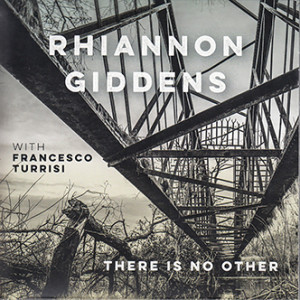 RHIANNON GIDDENS WITH FRANCESCO TURRISI
RHIANNON GIDDENS WITH FRANCESCO TURRISI
There Is No Other
Nonesuch – 591336-2
Rhiannon Giddens has proven to be an amazing musical conceptualist since she embarked on a solo career after her groundbreaking work in reviving the African American banjo and fiddle tradition with the Carolina Chocolate Drops. To name a few of her projects—she acknowledged a lineage of female singers with Tomorrow Is My Turn (2015); collaborated in setting long-lost Bob Dylan lyrics to music on Lost on the River: The New Basement Tapes (2014); celebrated the protest song tradition from African American enslavement to the civil rights movement on Freedom Highway (2017); and, earlier this year, collaborated with Amythyst Kiah, Leyla McCalla, and Allison Russell to explore New World slave narratives and reclaim the early minstrelsy and banjo traditions on Songs of Our Native Daughters. For this recording, Giddens teams up with Italian multi-instrumentalist Francesco Turrisi to broaden the scope of her musical vision to include sounds and genres that are drawn from an array of cultures to present a conception of musical inclusiveness that declares There Is No Other. As she explains in the liner notes: “From the beginning of our musical partnership we have been struck with the commonality of the human experience through music; how instruments, modes, and the very functions of songs and tunes are universal from culture to culture.”
With the exception of four tracks that feature Kate Ellis on cello or viola, all the music is performed by Giddens on minstrel banjo, octave violin, and viola and Turrisi on various wood-frame hand drums, stringed instruments, piano, and accordion. More than on any of her previous recordings, Giddens directly draws upon the full range of her musical background, including her studies in opera at Oberlin Conservatory and her immersion in African American and world folk forms. Turrisi brings a jazz sensibility, traditional Italian music, and his expertise on drums from North Africa and the Middle East into the mix. Kudos must be given to producer Joe Henry and engineer Ryan Freeland for creating an amazingly full, almost orchestrated soundscape with spare instrumentation.
Of course, Giddens’ warm, resonant, crystalline voice is at the center of all this. She is equally at home couched in the support of a plucked banjo and pulsing hand drum as she intones earthy folk standards like Wayfaring Stranger or Little Margaret, or haunting operatic pieces like Black Swan or Trees on the Mountains. Highlights include the poignant minstrel banjo, piano, and hand drum–supported reading of the Oscar Brown Jr. original / Nina Simone–associated Brown Baby; the driving, North African–accented version of Ola Belle Read’s Gonna Write Me a Letter; and the Giddens/Dirk Powell spiritual He Will See You Through that features Turrisi’s piano and Ellis’ cello supporting the soaring vocal by Giddens. There Is No Other emerges from a musical conception that elevates both the artist and the audience.
—Robert H. Cataliotti
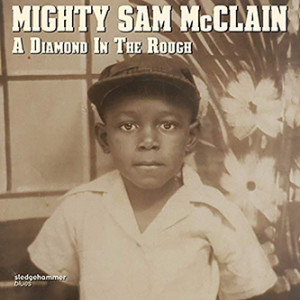 MIGHTY SAM McCLAIN
MIGHTY SAM McCLAIN
A Diamond in the Rough
Sledgehammer Blues – 2-AQM-1060
Born in Louisiana during World War II, the singer and songwriter known as Mighty Sam McClain passed away in 2015 at the age of 72. As a young man he had waxed a few 1960s singles and worked the chitlin’ circuit before dropping out of the music business during the subsequent decade. Fifteen years later McClain launched a comeback as a stage performer and recording artist, then relocated to New England. Over the next 20 years or so, he released a series of widely acclaimed albums on various labels. Upon his death, the contemporary music scene lost one of its most passionate interpreters of the gospel-inflected southern soul style of blues. Previously Time and Change—Last Recordings, issued in 2016, seemed to mark the final entry in McClain’s impressive discography. Yet, with A Diamond in the Rough he’s back for one last encore, and this intimately produced, 11-track album sparkles brilliantly.
The magic derives in large part from a minimalist aesthetic, for these cuts feature only McClain’s vocals accompanied by acoustic guitar, embellished on a few tracks with a touch of saxophone or flute. That supporting instrumentation—all performed by co-producer Pat Herlehy—though sparse is profoundly effective at highlighting the expressive possibilities of that mighty voice. Moreover, the stripped-down-to-the-essence sound integrates splendidly not only with McClain’s earthy delivery but also with the fundamental messages of the songs, all of which were written or co-written by the singer.
The opener, My Everything, exemplifies the charm of this stark production. As Herlehy lays down a mid-tempo chord progression accented with a bit of hot picking on the acoustic six string, McClain opens his psyche and lets flow a stream of gratitude for his woman. On Grooving, the solo guitarist instrumentally conjures more down-home funk as McClain emphatically proclaims again his happy state of union with a significant other. There’s also a lone and luscious saxophone that discretely retorts to vocals in a kind of call and response.
That sax resurfaces—and renders a potent solo—in Love’s Gonna Find, co-written by McClain and Charles Neville. The simple yet sincere lyrics promote a message of faith and idealism as the essential counterbalance to real world burdens: “Love is gonna to find a way / All you’ve got to do is lead with your heart / Don’t care what the people say / ’Cause if you believe in God and believe in your heart / Love’s gonna find a way.” Here and elsewhere McClain reveals himself to be a sort of secular evangelist who preaches the good news of love’s redemptive power.
That is not to say there is no despair in the songs. In a number called Where Is the Love? the singer admits frustration at the misunderstandings and indifference of the world. But ultimately it, too, is an uplifting sermon of sorts, which ends with exhortations: “We should be loving one another / We should be taking care of each other.” Lyrically speaking, Everytime is yet another monologue in which a man speaks directly to his woman. Punctuated by lively licks on acoustic guitar, the song reflects on a broken relationship, about which the man still carries a lingering obsession. Southern Land opens with a haunting blend of guitar and vocal moans. In the verses that follow, McClain acknowledges both “the good” and “the bad” emanating from the region of his birth. The song climaxes with a palpably painful pronouncement that he misses his mother, an angst compounded by the realization that he “can never go home again.”
Question consists of a series of queries again addressed directly to his woman. At the end it all comes down to this: “What would I do if I didn’t have you?” In the love that can be shared between two individuals McClain also finds a template for social improvement and the cultivation of hope. For instance, in Believe, amid soft flourishes on flute, he testifies, “I believe, Lord I still believe, that we can love one another before we die / I believe in you / Will you believe in me? / Let’s come together and set our people free / Let’s give them hope / Let’s give them love / That’s what they need.”
The closing track, Holy Ghost Fever, finds the singer approximating a Van Morrison–like state of trance as he riffs on the title line, prodding his listener to consider whether such divine ecstasy has been personally experienced. Yet it’s not only Christian theology that he cites but also blues deities—particularly Muddy Waters and Howlin’ Wolf—as capable of channeling that titular spirit. It’s a particularly appropriate finale, reminding us how inseparable are the style and substance of gospel from McClain’s own music.
As suggested by the album title, these songs are offered in their natural raw state, not prettified or altered much from the way they presumably came into being. Given that the sound quality and minimalist musicianship are excellent, that organic roughness is a virtue—and a refreshing break from the plethora of overcooked product on the market. As such, A Diamond in the Rough constitutes a fitting swan song for the earnest legacy of Mighty Sam McClain.
—Roger Wood
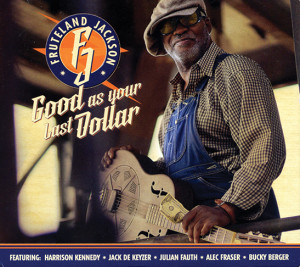 FRUTELAND JACKSON
FRUTELAND JACKSON
Good as Your last Dollar
Electro-Fi – 3457
Fruteland Jackson is a good-natured bluesman with an upbeat disposition, a unique character, a true blues persona. Like any old picker who has paid his dues over many decades, he also has a powerful concoction of personal pride, stubbornness, and devotion to his craft. There he is in Chicago, the capital of electric blues, the center of everything except the old-time acoustic blues reminiscent of his birthplace in Sunflower County, Mississippi. He could have dropped the country blues act long ago in favor of the more lucrative electric band sound favored in the Windy City. He could be the main act at Rosa’s or Buddy Guy’s. Yet, he accepts the early evening acoustic gigs, entertaining people with his stories and acoustic picking, holding true to the traditions. Always with his trademark oversized newsboy cap and baggy pants, he is an American original doing his own thing. Yet, even in the acoustic blues he is too often unsung and underappreciated, the awareness of which has given the bard an ornery indignation, but never a loss of humor. He knows who he is. He hung with Honeyboy Edwards, Robert Lockwood Jr., and Homesick James. He is an artist.
Fruteland Jackson is foremost an entertainer, a man who knows how to tell a compelling story, how to mesmerize an audience with his tangy tales, to make them laugh. Often artists with those essential elements can’t translate them well into recordings. Good as Your last Dollar, his first album in a decade, accomplishes it well, with a little help from his friends. Half of the 12 cuts are originals, ballads and stories, each with his trademark falsetto eerily reminiscent of Johnny Shines. Jack de Keyzer supports the album on guitars. Harrison Kennedy comes in on backing vocals, percussion, and harmonica. Julian Fauth joins on piano.
The album starts strong with Johnny Shines’ Two Steps to Hell, with convincing slide guitar and Fruteland sounding just like Shines. Fruteland sparkles on the title cut, Good as Your last Dollar, lamenting a certain undesirable financial predicament—owing money. He gets the mandolin out on Careless Love with Harrison Kennedy joining in to harmonize and blow harp. They pick up on distinctly Muddy Waters riffs in the lament All the Dad I Had, a song that will hit home with anyone who has had a not-so-good father. Fruteland puts on the shtick in his folksy talking blues How’s It Going?, one of his stage favorites, and let’s just say it’s not going too well: “broke, busted, and disgusted and I can’t be trusted; abused and scorned and leveled to the ground.”
Fruteland regularly covers Robert Johnson and he includes his favorite, Love in Vain. The hard-hitting, foot-stomping Peace in Hell by John Nicholas is a convincing blues that showcases Fruteland’s skill as a singer/guitarist. The album closes with the powerful chain-gang chant Blues 2.0: “You won’t get out of these blues alive.”
Fruteland Jackson is a prodigious practitioner of the acoustic blues. A true American original, one of a kind. Good as Your last Dollar is his most powerful artistic statement.
—Frank Matheis
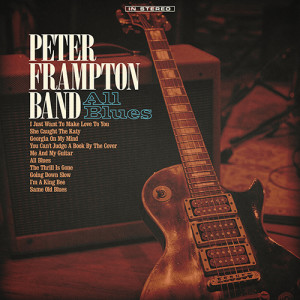 PETER FRAMPTON BAND
PETER FRAMPTON BAND
All Blues
UMe – B0030189-02
Given his recent disclosure that he suffers from a rare degenerative muscular disease and that his current tour will likely be his last, All Blues could be viewed as a denouement of sorts, a final bow in a career that’s taken him from pop idol to a harbinger of hard rock and, ultimately, solo success as a superstar. Those far more skeptical might see the album as yet another take on the standards, a tack taken by many of his contemporaries, from Paul McCartney to Rod Stewart and any number of vintage rockers in between.
In truth, Frampton hasn’t ever entirely left the blues. The scorching sounds he purveyed with Humble Pie shared several blues-based motifs, despite being embellished in a decidedly hard rock / heavy metal tapestry. After the overwhelming and unexpected awards reaped by Frampton Comes Alive!, he was content to plough the mainstream, while also attempting to reprise his earlier efforts with only modest success. Consequently, All Blues could be viewed as Frampton’s ultimate attempt at being taken seriously as a purist and perfectionist, given that it finds him retracing material that remains the indelible essence of music’s timeless template. Likewise, by sharing the spotlight with such master musicians as Kim Wilson, Larry Carlton, Sonny Landreth, and Steve Morse, he proves he’s well able to stand alongside some serious artists for whom the blues is sacred terrain.
While most of the songs are overtly familiar—I Just Want to Make Love to You, She Caught the Katy, I’m a King Bee, The Thrill Is Gone, and Georgia on My Mind in particular—Frampton and friends cover them with credence and conviction. Frampton’s fluid guitar licks are as melodious as ever, making it little surprise that the album’s two instrumentals dominate the effort overall—a lovely take on the aforementioned Georgia on My Mind, which finds Frampton’s studious riffing effectively emulating Ray Charles’ soulful vocal, and All Blues, a dense duet with Carlton that’s as riveting as it is relentless.
Suffice it to say that those who followed Frampton for his melodies and musicianship won’t be disappointed and may, in fact, view this effort as another step forward towards overall achievement. By the same token, Frampton fans accustomed to his affable approach and sugary sound might not be as appreciative of the fact he’s changed his trajectory. Yet, regardless of whether one considers it a total triumph or merely a satisfying sojourn, everyone can hope that it’s not a final farewell.
—Lee Zimmerman


